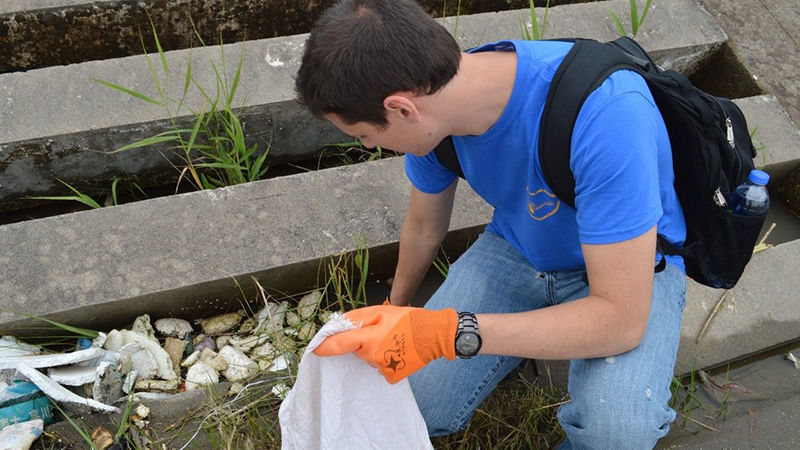

This dialog contains the full navigation menu for this site.

In 2004, the Penn State CHANCE (Connecting Humans and Nature through Conservation Experiences) program was founded at Penn State Lehigh Valley in order to empower students to take on the conservation issues confronting our planet. CHANCE presently has 45 partners around the world and is still under the direction of its founding director, Jacqueline McLaughlin, associate professor of biology at Penn State Lehigh Valley.
The CHANCE program consists of two main educational elements — international field courses and online research modules — with a core pedagogical approach, which entwines real-world and hands-on environmental research and conservation efforts with teaching.
CHANCE traveled with 24 students to China last July to research the pollution of and restoration efforts needed to preserve the water flowing through the Yangtze River watershed. Eight of the students came from Penn State Commonwealth campuses; eight were selected from Jiangnan University in Wuxi, China; and another eight were selected from Nanjing University in Nanjing, China. These students went through an intense application process and pre-program education that included online lessons and various books that were required to be completed or read, respectively, in order to learn basic wastewater treatment and environmental engineering strategies and/or conservation practices before departure.
CHANCE China took these students on a 17-day journey on, and along various tributaries of, the Yangtze River within four provinces to explore its watershed, pollution and damage, and the companies, infrastructures and human activities that are contributing to its demise. This global opportunity was eye-opening for the students. They walked away with a new understanding of the environment and how it should be treated.
Xiaoxue “Snow” Hou is a student from Nanjing University. She was selected to participate in the CHANCE China program and has since discovered that conserving the environment is a new passion for her. At the time of the program, she was a third-year student majoring in geographical science with the intention of becoming an environmental engineer.
From her CHANCE research, Snow discovered that although efforts have been taken by both Chinese governmental and non-governmental organizations to restore and conserve China’s water supply, these efforts are not producing the results that are needed. This is caused by the present day technological and economic deficiencies that her country is facing. She believes that one of the first steps that needs to be taken to fix this problem is for China to become more efficient economically, and to invest in projects that are built from proper knowledge on how the ecosystems work. She also believes that every Chinese citizen should be properly educated on ways to help protect China’s precious water supply so that they can prevent further damage. It is Snow’s hope that by raising awareness more people will get involved and help.
“I treasure the experience we had visiting Bao Steel Company and various refuse disposal plants,” she said. “Everything shocked me. I never got close observations like I had through CHANCE by just reading textbooks.”
Tyler Adams, a genetics and developmental biology major at Penn State, also attended CHANCE China last year. He reflected on the importance of the conservation efforts being made in order to provide the people of China with clean water.
“Sustainability, in its simplest sense, is a balancing act between three factors. These factors include people’s health and happiness, the ecosystems' health, and maintaining the economy,” he said. “Currently, it is impossible to maintain this reality in China. Human actions and behaviors are depleting the quality and quantity of not only the Yangtze River, but all water bodies at an alarming rate.”
This program helped him see exactly what is happening to the environment and what he and other people can do about it to either slow it down or reverse what is happening.
“In order to continue restoration, large-scale environmental cleanups and laws need to be implemented to increase the water quality and to prevent more water pollution,” said Adams. “Strict water-quality testing must also be performed periodically to ensure a continued restoration. However, increasing the quality is still not enough. Policies need to be enacted to decrease the watershed’s fast, out of control, consumption. Certain guidelines should also be enforced so that those who violate the water sanctions are heavily penalized."

WPSU Senior Producer Frank Christopher traveled to China with the CHANCE China program last July. This is a preview of a film that will document what they saw and what they did.
McLaughlin also had an impact on the students in attendance through her demonstrated dedication to both teaching and conservation. Snow credits her decision to become a conservationist to McLaughlin’s devotion and passion. She was highly impacted by the efforts she saw put forth by McLaughlin in China.
“The most impactful program that I have developed is CHANCE China. Without a Clean Water Act or regulated mandates on water pollution in this country, each and every river, lake and stream is suffering from poor water quality, and the life forms within them are becoming extinct,” McLaughlin said. “To have Chinese and American students and professors analyze, then present their authentic data on the water quality and issues affecting the Yangtze watershed with the government’s permission was a landmark for CHANCE and eye-opening for all involved.”
McLaughlin is the founder of the CHANCE program, and has worked to set up field programs that focus on real-world environmental issues in China, Costa Rica, Panama and the United States. Presently, she is developing a field program in Cuba. This month McLaughlin is leading another CHANCE program in Costa Rica. This two-week field summer practicum will explore the ecology of and conservation efforts needed to preserve the tropical rainforests, as well as conservation efforts geared toward saving endangered sea turtles along the Caribbean coast.
“I learned what it means to be a conservation biologist, and work alongside fellow students and field researchers with the same goals in mind: to create a sustainable future for the Earth,” Adams said.
The CHANCE program has been beneficial to its host communities in many ways, including having students volunteer at impoverished schools to teach environmentally themed lessons, pick up trash with local non-governmental agencies (NGOs), reforest abandoned farmlands or clear-cut rainforests, or build hatcheries to protect sea turtle eggs from poachers, to name a few activities. Penn State CHANCE, with the aid of its numerous partners, hopes to continue to inspire students and teachers to think beyond the classroom and to take real and meaningful action in the name of conservation.


